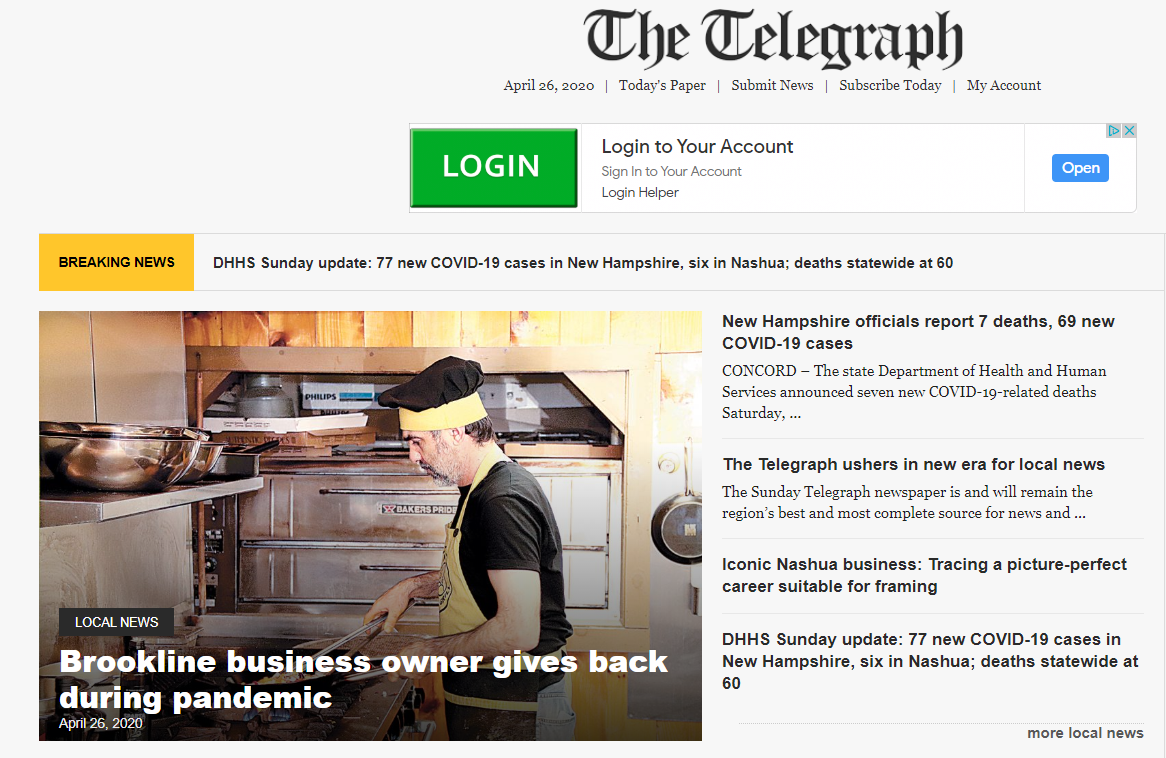By NANCY WEST, InDepthNH.org
Saying they are “accelerating our move into the future,” The Telegraph of Nashua is moving online and ending its print publication except for the Sunday edition every week starting immediately, Monday April 27.
Under the headline “The Telegraph ushers in new era for local news,” the newspaper made the announcement Sunday and promised “The Sunday Telegraph newspaper is and will remain the region’s best and most complete source for news and advertising.
“While we will continue to showcase the people and news of Nashua and indeed the state in our traditional full print Sunday edition, we at The Telegraph are moving to online, mobile and text notification news during the week.”
Publisher Heather Henline said: “We look forward to continuing that legacy of quality in both print and online as The Telegraph ushers in this new era amid COVID-19 and best serving readers and advertisers at a time when the need for real-time access to reporting is critical to our community.
“The Telegraph and news industry as a whole are having to adapt like so many businesses as we continue to provide service to our customers,” Henline said. Ogden Newspapers of Wheeling, West Virginia, owns The Telegraph.
The Telegraph is the first daily newspaper in New Hampshire to make the transition to what some experts see as inevitable for some local dailies, but it likely won’t be the last. The COVID-19 pandemic has brought some businesses and much of the advertising that has always financed newspapers to a standstill. And many local newspapers were struggling financially before COVID-19.
Other New Hampshire newspapers have taken steps to tighten their belts and two, the Concord Monitor and the Valley News, both owned by Newspapers of New England, have launched fundraising campaigns.
Meanwhile, the Seacoastonline newspapers that are owned by Gatehouse, which recently merged with Gannett, have required employees, including Executive Editor Howard Altschiller, to take an unpaid furlough one week of each month for three months, except those who make $38,000 a year or less and some press and delivery people.
They include the Portsmouth Herald and Foster’s Daily Democrat.
The New Hampshire Union Leader has furloughed 24 full- and part-time employees for three months who were able to keep their health benefits.
The Valley News announced how they are reducing expenses, which includes layoffs and a reduction of hours for some employees. “Managers are taking an across-the-board pay cut,” Publisher Dan McClory wrote last month.
“We have had to reduce our page count as the world around us grapples with this historic pandemic as businesses are forced to close or reduce hours. We can’t cover sports and the local arts when they don’t exist…
“The hard truth is that no one knows what the future holds. We all hope that things will return to some sense of normalcy and we will be able to reinstate the resources and content that have been affected. We will continue to do our very best to serve the readers of the Upper Valley,” McClory said.
Readers have responded to the Valley News through a fundraising campaign that had raised $131,764 as of Sunday night in donations that were not tax deductible.
A similar campaign at the Concord Monitor that offered tax-deductible donations had raised $31,690 as of Sunday night.
Ten days ago, Karen Andreas, publisher of The Eagle-Tribune, said they were going to stop publishing print editions two days per week — on Tuesdays and Saturdays.
“On those two days, our journalists will continue to produce news stories, photography, videos, podcasts and more, but on our websites only, which are free to subscribers,” Andreas wrote.
“This difficult decision comes as we face a sharp decline in advertising revenue, due to widespread business closures. Reducing print days provides much-needed savings in newsprint, production and delivery costs,” Andreas wrote.
Poynter has been tracking layoffs and furloughs.
Veteran newspaper owner and editor John Harrigan of Colebrook said there is a percentage of households that don’t have computers or the Internet because of choice or economics. Those people won’t be able to access the news and they are likely people advertisers don’t really care about anyway, he said.
“I’m not surprised,” said Harrigan of the Telegraph’s move online. His first newspaper job was at the Telegraph in 1968.
“Many newspapers are teetering on the edge of giving up their print version and going totally online. For many newspapers, (COVID-19) is just the excuse they were looking for to go online and get out of the business” of print.
Mark Guerringe, publisher of The Conway Daily Sun and The Berlin Sun, and co-owner of The Laconia Daily Sun, said: “In general, the virus has accelerated trends by five years, including newspapers……Our newsprint supplier told me his forecast for newspaper consumption decline has been advanced by four years.
“I’ve said in the past that newspapers which go digital is like going to hospice, but now there may be a sweet spot that includes digital midweek and Sunday print for paid dailies. We’ll see,” Guerringue said.
The Telegraph said in its announcement that, “With COVID-19 all around us, this is the time for change.”
The next weekly print edition of The Sunday Telegraph will be delivered Saturday, May 2. The Sunday print edition will be delivered Saturday mornings to provide early weekend access for extended reader experience, the announcement said.





